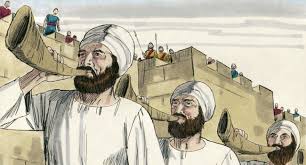
As far as Joshua was concerned, Moses died too young. Admittedly Moses died at the age of 120, a ripe old age, whether the figure is mathematics or poetry. But doubtless Joshua looked forward to Moses entering the Promised Land and continuing the conquests there as he conquered Sihon and Og in the Transjordan. His death on Mount Nebo meant that task of Canaanite conquest then fell to Joshua, rather than to Moses. The torch of conquering and possessing the Promised Land fell squarely—and perhaps unwelcomingly—upon his comparatively young shoulders.
Fortunately for Joshua, God commissioned him as plainly as He commissioned Moses: “Moses My servant is dead; now therefore arise, cross this Jordan, you and all this people, to the land which I am giving to them to the sons Israel…Have I not commanded you? Be strong and courageous! Do not tremble or be dismayed, for Yahweh your God is with you wherever you go” (Joshua 1:2, 9).
Obviously God told Joshua not to fear because humanly speaking he had every reason to fear. His leader had died, and the peoples of Canaan were many and vigorous, and their cities heavily fortified. Israel had precious little experience of warfare. The spies that a generation ago had given a spectacularly pessimistic analysis of their chances of victory (see Numbers 13) were not wrong. The cities there were strong and the people well-armed. The notion that a large group of liberated Egyptian slaves with little experience of warfare could eventually occupy the whole country seemed absurd. Yet this was the long-term project and the covenantal torch that Joshua inherited from Moses.
We must not exaggerate or misunderstand this mandate, however. Joshua was not tasked with militarily conquering the entire land of Canaan, putting everyone to the sword and then occupying their now vacant towns. A scorched earth policy was never in the cards—which is perhaps why later archaeologists could find no trace of it in the archaeologically layered rubble. Joshua’s task was to conduct a series of lightning raids on strategic sites, softening up the various tribes, power centers, and fiefdoms so that future generations could do the actual work of conquering and expulsion. Joshua and his forces were to conduct these raids and then return to their base camp in Gilgal.
Thus Kenneth Kitchen, in his On the Reliability of the Old Testament: “These campaigns were essentially disabling raids; they were not territorial conquests with instant Hebrew occupation…This is not the sweeping, instant conquest-with-occupation that some hasty scholars would foist upon the text of Joshua” (p. 162, 163). But even so, the task was daunting enough. There were many towns and villages, and none of them were going down without a fight. Driving out the Canaanites and occupying their territory would be the work of years.
In Joshua we learn the necessity of perseverance and the wisdom of taking the long view. Joshua inherited from Moses an unfinished task, and it would remain unfinished even when he completed his series of lightning disabling raids. God told him as much: “You are old, advanced in years, and very much of the land remains to be possessed” (Joshua 13:2). That work would continue in the years to come, after Joshua had been gathered to his fathers and Israel was ruled and helped by a series of judges.
It is important to remember this and to take the long view when faced with doing difficult work. We may never bring the work we do to complete fruition. Sometimes we may discover that all our work has been in vain, or that it will be undone by others after we are gone. That cannot be our concern. Our sole concern is not with the ultimate and lasting result, but with doing what God calls us to do. Our goal is not success as the world counts success, but faithfulness.
In other words, our sole task is to fight on in the battles to which God calls us. I remember a prayer which asks that God grant us the strength to give and not count the cost, to fight and not heed the wounds, to toil and not seek for rest, to labour and not ask for any reward except the knowledge that we are doing God’s will.
This was the attitude of Joshua. We who follow in his footsteps and fight the good fight of faith must strive to make it our attitude as well. There is a spiritual battle to be fought, both by the Church as a whole and by its members as individuals. We inherited the fight of faith as soldiers in the militia Christi when we were first made catechumens (compare the reference in that rite to “this sealed, newly-enlisted soldier of Christ our God”). The battle of light against darkness was raging before we stepped forward to enlist, and it will still be raging long after we are dead and gone. We have been assured that the final victory has already been won. Until then we will not let our sword sleep in our hand. For us there will be no retreat, no surrender. Like Joshua, we will fight on.
